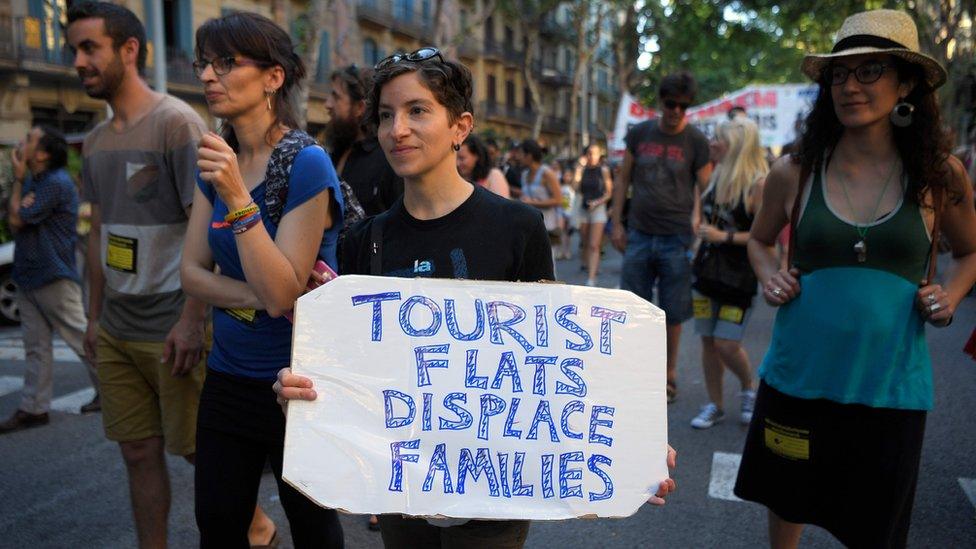Spain's hotel chambermaids 'Las Kellys' fight for fair pay
- Published
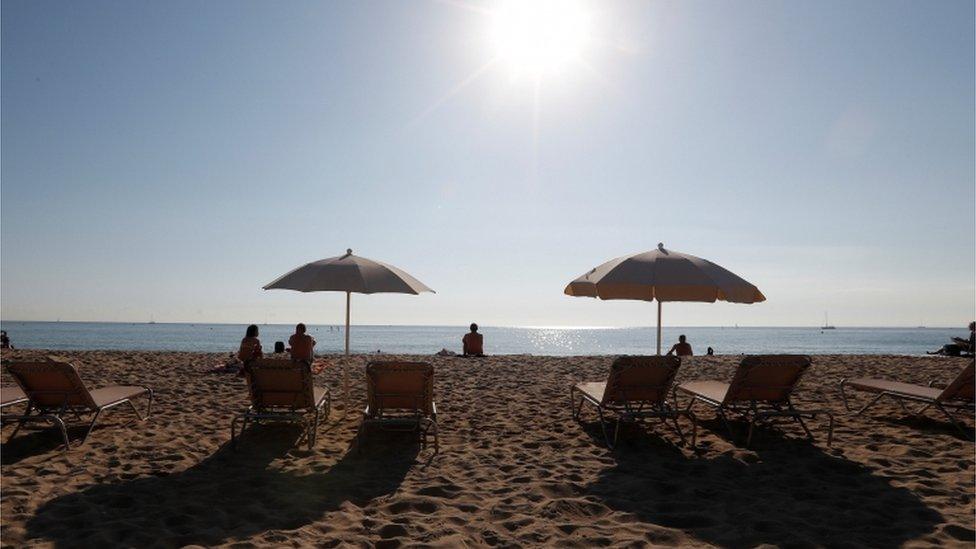
Spain's tourism sector is heading for another bumper year, with last year's figure of 76 million foreign visitors looking set to be a short-lived record.
But within the industry, some people think their essential work is being seriously underappreciated - chambermaids, women who clean hotel rooms in increasingly precarious conditions and poor pay.
"We are all women. There are virtually no men," says Ángeles Muñoz, leader of the Madrid branch of Las Kellys, a play on the Spanish words for "the girls who clean" (las que limpian).
While room cleaning has never been a road to riches, Las Kellys argue that a reform to Spain's labour market in 2012 paved their way to hell, allowing hotels to outsource cleaning services to companies that do not have to respect established industry standards.
In a tourism industry that last year produced earnings of €125bn (£112bn) - 11% of Spain's economy - hotel room cleaners say they are paid less, prone to more health problems and less respected than ever.
Fear of reprisals
"Without clean rooms, a hotel does not have a product. But we are invisible, despite being 30% of a hotel's staff," says Ms Muñoz, who claims to have been blacklisted by two hotel chains for her militancy after 20 years in the job.
"Many chambermaids are from especially vulnerable sectors of society, including immigrants and single mothers. They are frightened to be seen and fear reprisals or losing the pay they are getting."
Until 2012, Madrid's chambermaids on full-time contracts were paid €1,200 a month under a sector-wide collective agreement, Ms Muñoz explains.
But then came reform by Spain's conservative government that made it legal for hotels to farm out the work to contractors who pay about €800 for shifts that are meant to be six hours long.
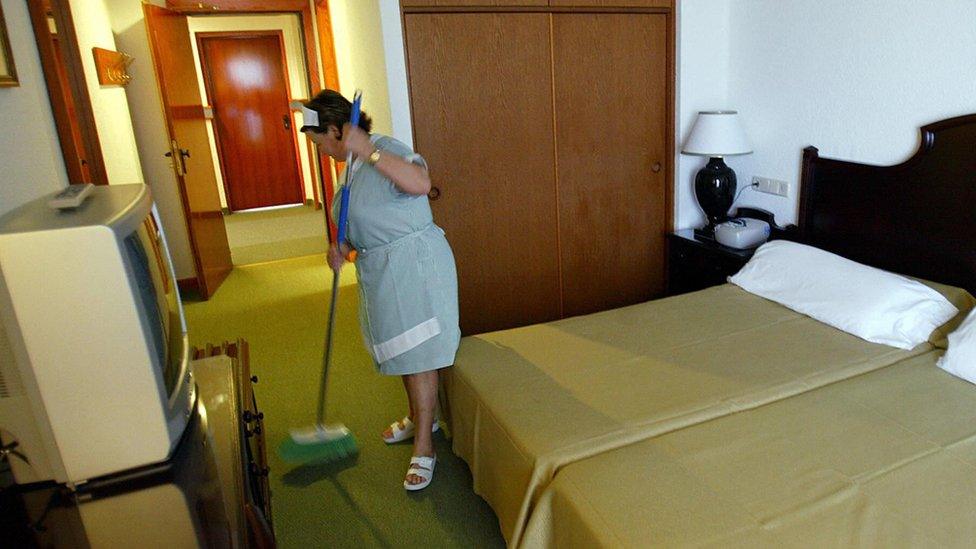
Chambermaids are cleaning up to 30 rooms a day, according to Las Kellys
"But the girls still have to do the same number of rooms or more, normally 20 per shift. They get no breaks and don't know when they will be needed again, typically receiving a WhatsApp message saying 'come in tomorrow'."
In other parts of Spain, pay is even lower.
'€1.25 per room'
From Lanzarote, one of the Canary Islands, Las Kellys Myriam Barros says typical wages have slumped from around €1,400 a month to half that amount, with chambermaids cleaning up to 30 rooms a day.
"That can mean girls are getting as little as €1.25 per room, and that's before tax and deductions."
As well as a decent wage, Las Kellys want the right to retire before at 67 in recognition of the hard labour and injuries they suffer.
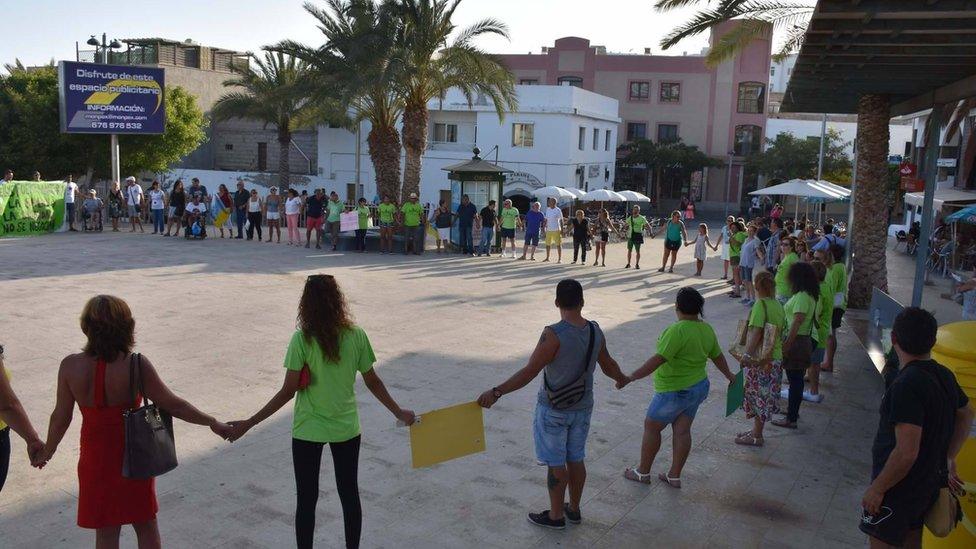
Las Kellys try to bring attention to their working conditions at a protest in Fuerteventura
They combine cheery sing-a-long demonstrations with detective work, sending photographs and reports to the labour-standard inspectors where they suspect abuses.
But far from making life easier, standing up for their rights can make chambermaids' lives harder.
Ms Barros reported being punched by a security guard while demonstrating against the outsourcing of cleaning services outside a hotel in Fuerteventura, another Canary Island, earlier this year.

Cost of complaining
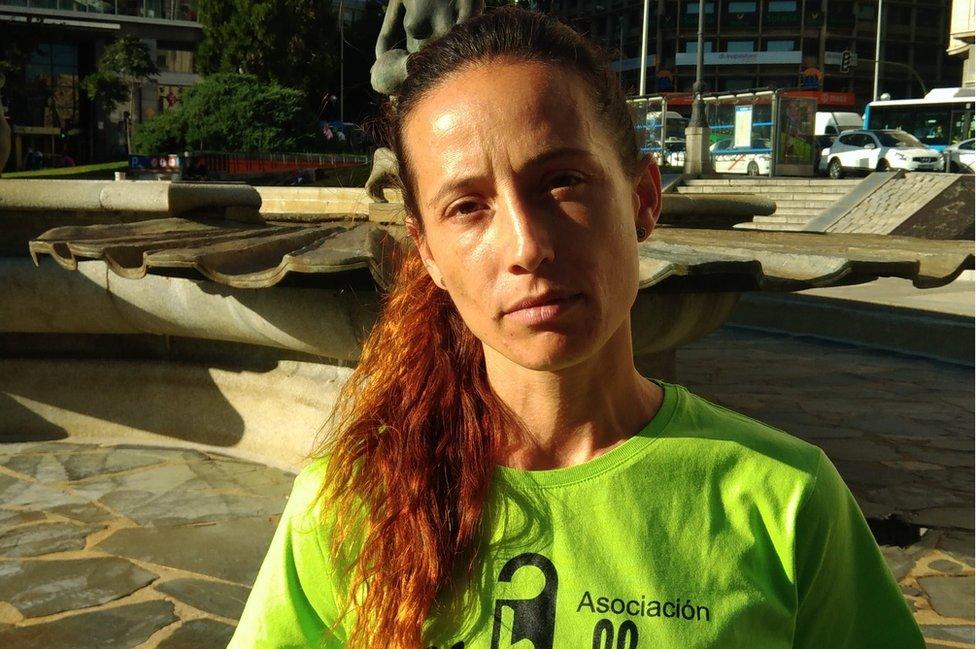
Olga Romero says she was punished for trying to improve conditions
Olga Romero believes that being a Kelly cost her her job as a temporary chambermaid at a tourist apartment complex in Las Palmas, Gran Canaria.
"I was informing the other girls about Las Kellys and they called me in and said I was fired," the 34-year-old single mother says.
Ms Romero was not surprised. "First they tried intimidation, doing things like giving me more work to do. Then they started calling me in on my days off saying that I had left work undone."
But Las Kellys reported the contractor to officials in the Canary Islands. The BBC has seen letters from the the labour-standard inspectorate, ruling that Ms Romero's temporary contract and those of the rest of the staff are fraudulent and that they should be taken on as permanent employees.
Ms Romero says that the company has so far not complied with the ruling.
She says she does not miss a job in which the women have to clean 25 apartments, including kitchens, in a shift that can stretch to 10 hours when it should be six - and all for €916 a month.
"The way things go, chambermaids are only good for three years - it's so hard. They keep you working at the limit on slave wages, and that way it's profitable for them."

The Spanish Confederation of Hotels and Tourist Accommodation (CEHAT) declined to respond to the BBC's questions with regard to Las Kellys' demands.
Meliá Hotels International, the hotel chain with the largest share of the Spanish market with 314 establishments in 2016 and more than 80,000 rooms, said it "respected and complied with existing rules, both at the national level and in terms of collective bargaining".
But one leading figure in Spain's hotel sector, Antonio Catalán, the president of AC Hotels by Marriott, is speaking out against what he sees as "a tragedy caused by abuse of labour laws".
"The sector is going well and doesn't need to do this," he says, adding that company does not outsource cleaning.
"In all of our hotels chambermaids get the going rate according to the sector's guidelines. If we have to earn a little less by paying properly, then so be it."
But Ms Muñoz says that in most hotels, complaints about bad conditions are typically met with a blank rejection.
"We are told over and over: that's the way it is; if you don't like it, there's the door. Employers know that with Spain's unemployment, there are people waiting.
"Many of us have had to take tranquilisers for stress. One woman I know says she has to get to work half an hour early to make sure she gets a mop. Otherwise, they run out and you are told to scrub floors on your knees."
- Published10 August 2017

- Published5 August 2017
